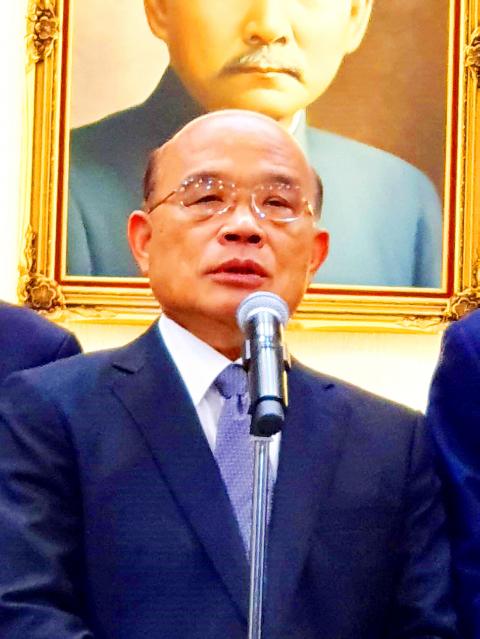The Judicial Yuan’s draft amendments to the Code of Criminal Procedure (刑事訴訟法) and the Implementation Rules of the Code of Criminal Procedure (刑事訴訟法施行法) were approved yesterday by the Executive Yuan.
The proposed amendments, under which 107 articles would be added or amended, are part of the government’s judicial reform efforts.
The main purpose of the proposed amendments is to improve overall trial efficiency, said Premier Su Tseng-chang (蘇貞昌), who presided over the Cabinet meeting.

Photo: Lee Hsin-fang, Taipei Times
Su said that he asked the Ministry of Justice to communicate and coordinate with the Judicial Yuan and the legislature to ensure passage of the proposals.
The requirements for filing appeals for second and third trials are relatively loose, which is why there are many appeals and the current system has been described as a “cylindrical” structure, Minister Without Portfolio Lo Ping-cheng (羅秉成) said.
During the National Conference on Judicial Reform in 2017, officials decided to amend the two bills to reduce the number of appeals and turn the criminal procedure system into a “pyramid” structure, he said.
With “speedy trials for obvious cases and careful judgement of unsolved cases” as its core belief, the Judicial Yuan wants to expand the number of cases that require defendants to have defense attorneys, as well as divide cases into two categories, officials said.
The Judicial Yuan has said it has five major objectives with the criminal law proposals.
They are: To adopt a division in criminal procedure in which “obvious cases” and “unsolved cases” are separated; to improve the ability of the first trial to judge the facts of a case; to have the second trial be both a review of a case and a continuation of the first trial; to have the third trial strictly address questions of law and cases that were permitted an appeal; and to strengthen the protection of the defendant’s right to the assistance of counsel, the officials said.
The Judicial Yuan, the ministry and attorney organizations took part in multiple meetings convened by Lo to review and advise on the proposals, they said.
The Executive Yuan generally supports and respects the reform idea behind the proposals, but advised a careful and stable path to reform, the officials said.
Under the current judicial framework, amendments should be made to address the issues that are encountered in practice to protect the people’s rights as well as maintain the criminal procedure structure, they said.
The Executive Yuan asked the Judicial Yuan to carefully consider whether to make drastic amendments to the Code of Criminal Procedure to restrict the range of appeal under the current law, they said.
After evaluating the protection of the litigants’ right to a lawsuit and the systemic function of the second and third trials, the Executive Yuan would provide the legislature and the Judicial Yuan with counterproposals and suggestions, the officials said.

A preclearance service to facilitate entry for people traveling to select airports in Japan would be available from Thursday next week to Feb. 25 at Taiwan Taoyuan International Airport, Taoyuan International Airport Corp (TIAC) said on Tuesday. The service was first made available to Taiwanese travelers throughout the winter vacation of 2024 and during the Lunar New Year holiday. In addition to flights to the Japanese cities of Hakodate, Asahikawa, Akita, Sendai, Niigata, Okayama, Takamatsu, Kumamoto and Kagoshima, the service would be available to travelers to Kobe and Oita. The service can be accessed by passengers of 15 flight routes operated by

Alain Robert, known as the "French Spider-Man," praised Alex Honnold as exceptionally well-prepared after the US climber completed a free solo ascent of Taipei 101 yesterday. Robert said Honnold's ascent of the 508m-tall skyscraper in just more than one-and-a-half hours without using safety ropes or equipment was a remarkable achievement. "This is my life," he said in an interview conducted in French, adding that he liked the feeling of being "on the edge of danger." The 63-year-old Frenchman climbed Taipei 101 using ropes in December 2004, taking about four hours to reach the top. On a one-to-10 scale of difficulty, Robert said Taipei 101

Taiwanese and US defense groups are collaborating to introduce deployable, semi-autonomous manufacturing systems for drones and components in a boost to the nation’s supply chain resilience. Taiwan’s G-Tech Optroelectronics Corp subsidiary GTOC and the US’ Aerkomm Inc on Friday announced an agreement with fellow US-based Firestorm Lab to adopt the latter’s xCell, a technology featuring 3D printers fitted in 6.1m container units. The systems enable aerial platforms and parts to be produced in high volumes from dispersed nodes capable of rapid redeployment, to minimize the risk of enemy strikes and to meet field requirements, they said. Firestorm chief technology officer Ian Muceus said

MORE FALL: An investigation into one of Xi’s key cronies, part of a broader ‘anti-corruption’ drive, indicates that he might have a deep distrust in the military, an expert said China’s latest military purge underscores systemic risks in its shift from collective leadership to sole rule under Chinese President Xi Jinping (習近平), and could disrupt its chain of command and military capabilities, a national security official said yesterday. If decisionmaking within the Chinese Communist Party has become “irrational” under one-man rule, the Taiwan Strait and the regional situation must be approached with extreme caution, given unforeseen risks, they added. The anonymous official made the remarks as China’s Central Military Commission Vice Chairman Zhang Youxia (張又俠) and Joint Staff Department Chief of Staff Liu Zhenli (劉振立) were reportedly being investigated for suspected “serious